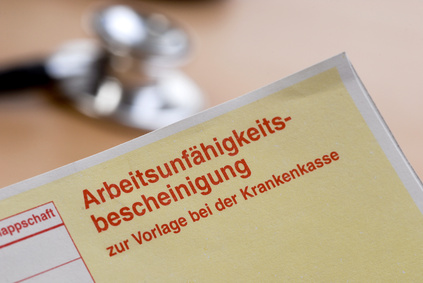Norbert Finkenbusch
February 1, 2015 by NF | 1 comment

Sickness benefit at illness of a child (child care sick pay) receive insured persons,
- if, according to a medical certificate, it is necessary for them to stay away from work to supervise, care for or care for their sick child, who lives in the same household and is self-insured,
- another person living in the household cannot supervise, look after or care for the child and
- the child has not yet reached the age of 12 or is disabled and is dependent on help (see Section 45 (1) sentence 1 SGB V).
During this time, the employee is entitled to an exemption from work. At the same time, there may also be a right to continued payment of wages.
The right to child care sickness benefit is limited to cases in which the sick child, e.g. B. due
- family insurance according to § 10 SGB V,
- the application for an orphan’s pension in accordance with Section 189 (1) SGB V,
- the drawing of an orphan’s pension in accordance with Section 5 (1) No. 11 SGB V,
- a voluntary insurance according to § 9 Abs. 1 No. 2 SGB V
is itself legally insured. The children mentioned in Section 10 (4) SGB V also count as children within the meaning of Section 45 (1) Sentence 1 SGB V (see Section 45 (1) Sentence 2 SGB V). The general provisions on sick leave apply to child care sickness benefit. This also includes the exclusion of the claim (cf. § 44 Paragraph 2 SGB V), the declarations on the right to choose the right to sickness benefit (cf. § 44 Paragraph 2 Clause 1 No. 2, 3 SGB V) and the provisions of Statutes on the electoral tariffs (see § 53 Paragraph 6 SGB V).
The entitlement is limited to children who have not yet reached the age of twelve. However, if the child is disabled and dependent on help, the entitlement exists regardless of the child’s age. If the entitlement is limited to the age of twelve, the entitlement also ends at this time during the current subscription.
Children are disabled and dependent on help if their physical function, mental ability or mental health are more than likely to deviate from the condition typical for their age for more than six months and their participation in life in society is therefore impaired (cf. § 2 para 1 sentence 1 SGB IX).
Disabilities can be congenital or acquired. It is not clear from the law whether the right to sickness benefit depends on the fact that the disability occurred at a certain point in time. For this reason, the view held in practice cannot be approved that the disability must have occurred within the age limits of Section 10 (2) Nos. 1 – 3 SGB V. Rather, it is crucial that the disabled child is insured with a health insurance company and lives with the employee in the same household.
Children are entitled to sickness benefit for each child for a maximum of 10 working days in each calendar year. Each insured parent can claim sickness benefit for the same child for up to 10 working days, taking into account the new maximum entitlement period. If there are several insured children in the family, the entitlements exist several times in a calendar year. Overall, the entitlement for an insured person within a calendar year is limited to 25 working days.
In the case of single parents, the maximum entitlement per child in the calendar year is set at 20 working days or for a number of children a total of 50 working days. Taking into account the actual circumstances, it must be decided in individual cases whether the applicant parent can be regarded as a single parent. Insured persons who are de facto single as a parent are also deemed to be single parents within the meaning of Section 45 (2) sentence 1 SGB V. For the extended entitlement to child care sickness benefit of 20 working days, it is then not a question of sole custody, but of the fact that the child is actually living alone during the upbringing (e.g. if the child basically lives in the same household with one parent and only everyone two weeks at the weekend with the other parent .. In these cases, the term single parenting can only be used for parents who
- are effectively single,
- live with the child in a household and
- have custody of the child alone or together with another (exception: stepchildren, grandchildren and foster children).
A single parent can therefore also be a single parent who is not entitled to sole custody. If the parent concerned is deemed to be de facto single during the upbringing, he is entitled to childcare sick pay for 20 working days.
In the event of a change of status from a joint custody to a sole custody or vice versa, the maximum entitlement period for child care sickness benefit pursuant to Section 45 Paragraph 2 SGB V of a maximum of 20 working days per child (or 50 working days) must not be exceeded.
Since January 1, 2015, sickness benefit has been calculated on the basis of the net wages that were not paid during the leave (similar to continued payment in the event of illness). The net wages are determined from the gross wages, insofar as contributions to health insurance have been calculated.
- The gross sick pay is 90% of the net wages.
- One-time payments are taken into account if they were paid in the last 12 calendar months before the exemption. The gross sickness benefit is then 100% of the net wages lost, regardless of the amount of the one-time payment.
- The sickness benefit per calendar day must not exceed 70% of the limit for the daily contribution assessment in health insurance.
Child care sickness benefit is payable from the day on which the conditions for this are met. There are no waiting days.
There is an unlimited right to childcare sickness benefit for children who have not yet reached the age of 12 or who are disabled, dependent on help and suffering from an illness,
- the progressive – d. H. progressing and inexorably worsening – and has already reached a very advanced stage,
- in which a cure is excluded and palliative medical treatment – i.e. pain and pain relieving treatment – is necessary or desired by a parent and
- that can only be expected to have a limited life expectancy of weeks or a few months.
The entitlement exists for a parent irrespective of whether another person living in the household can take over the supervision, care and care of the seriously ill child (cf. § 45 Paragraph 4 Clause 2 SGB V). The entitlement is not limited in time.
The claim exists insofar as and as long as the medical and insurance law requirements are met. In practice, it is recommended to pay sickness benefit if the child is expected to have a life expectancy of up to six months. The claim ends when the child dies.
Sickness benefit is calculated and paid for calendar days like sickness benefit in the event of incapacity to work (see § 47 SGB V).
Insured employees are entitled to an exemption from work for the duration of the entitlement to sick pay (cf. § 45 Paragraph 3 Sentence 1 SGB V). Whether the employer continues to pay the remuneration for this period depends on the content of the employment relationship.
All employees are entitled to an exemption regardless of whether they are insured with or without sickness benefit from a statutory health insurance company (see Section 45 (5) SGB V). The regulation also covers employees who have health insurance with a private insurance company.
Employees are entitled to Continuation of the Wages, provided that they are prevented from performing their work for a relatively insignificant period of time through no fault of their own for no fault of their own (see § 616 sentence 1 BGB). A period of up to 5 working days is not considered to be relatively significant.
One reason in the person of the employee is the supervision, care or care of a sick child. The claim can be excluded by contract (e.g. through a collective agreement or an employment contract). A collective bargaining agreement on a paid exemption displaces the claims from § 616 sentence 1 BGB.
As an alternative to excluding continued payment, employees and employers can agree to a sickness benefit. This is not harmful to the entitlement to sickness benefit if, together with the sickness benefit, it does not exceed the net wages by more than EUR 50 per month.
Trainees are also entitled to paid leave of absence when supervising, caring for or caring for a sick child (see Section 19 (1) (2) (b) BBiG. This claim takes precedence over the claim under Section 616 sentence 1 BGB and is not contractual can be excluded (see § 25 BBiG).
Insured employees are entitled to unpaid leave from work for the period in which they are entitled to child care sick pay (cf. Section 45 (3) sentence 1 SGB V). This also applies to the care of seriously ill children (cf. § 45 para. 4 sentence 3 SGB V).
The employee’s right to indemnification cannot be excluded by means of collective bargaining or individual contractual provisions (see § 45 Paragraph 3 Sentence 3 SGB V). An unjustified exemption can be offset against a later claim for exemption (see § 45 Paragraph 3 Sentence 2 SGB V).
Insured employees prove their entitlement to childcare sick pay to the health insurance company with a medical certificate. They also state that there is no other person in the household who can take care of the child. The right to an exemption from work is evidenced by a certificate from the health insurance company that the sickness benefit has been paid.
The entitlement to sickness benefit also exists in addition to a right to continued payment by the employer. However, there is no payment by the health insurance for the duration of the continued payment (the entitlement to sickness benefit is suspended; see § 49 Paragraph 1 No. 1 SGB V). A subsidy from the employer for sickness benefit is not harmful to the payment if the subsidy together with the sickness benefit does not exceed the net wages by more than EUR 50 per month (see § 23c (1) sentence 1 SGB IV).
In connection with the entitlement to sickness benefit, the health insurance company also checks whether from the content of the employment relationship entitles the employer to continued payment of wages. If the employer justifies or refuses to continue paying the wages, the health insurance company pays sick pay.
The entitlement to continued payment continues to the health insurance if the employer wrongly refuses to continue payment (see § 115 SGB X). The health insurance company can assert the transferred claim by bringing an action before the labor court.
RELATED ITEMS
-

Child sick? Release of the employee from work and continued payment of the salary – lawyer will
Sickness benefit if the child falls ill (Photo: © -Bernd Leitner / fotolia.de) Employees are generally entitled to leave from work if…
-

Time off from work if the child is sick
Pia Kotzur has been working as an editor at NetMoms since 2010 and has since been able to gain a lot of experience on what moves mothers in everyday life. After your…
-

Absence of the worker with a sick child
In the case of a sick child, it must be clarified how an exemption from work can be granted and which entitlements to remuneration and sick pay…
-

Child sick – continued payment vs
Small children are often sick. That is normal. As a rule, this means that one parent, usually the mother, has to look after the child….
